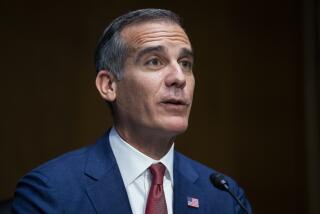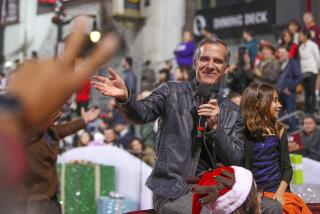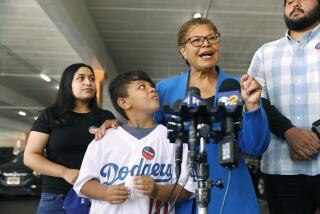Garcetti, Greuel fight for African American votes in final hours
A two-year-long campaign that has drawn record spending will put either the first woman or the first elected Jewish leader in the Los Angeles mayor’s office.
But despite those milestones, candidates Wendy Greuel and Eric Garcetti sped around the city Sunday trying to avoid another distinction—drawing the lowest turnout for an open mayoral seat in modern history.
The two candidates reached out to voters from churches, to a pizza parlor and a bowling alley on a long day of campaigning—their last extended opportunity to connect directly to voters before Tuesday’s election. Both focused particularly on African American voters, who polls show have tended to favor Greuel, the city controller, though many remained undecided.
FULL COVERAGE: L.A. mayor’s race
In a race in which she has had the financial advantage because of massive “independent expenditures” by organized labor, Greuel has been fighting to make up the four percentage points she trailed Garcetti by when the two emerged from a March primary to become the finalists for mayor. Greuel still lags seven percentage points behind Garcetti 48% to 41%, according to a USC Price/Los Angeles Times poll released Saturday night.
Greuel’s camp claimed the race was closer and that enough undecided voters remain to hold out the opportunity for victory. The candidate said that, before setting off for 10 campaign stops from San Pedro to Studio City Sunday, she asked her 9-year-old son, Thomas, what she should emphasize in the campaign’s final hours. Thomas told her to tell voters she is “a fighter.”
“We are going to fight for a better city,” Greuel told more than 1,000 parishioners at the warehouse-sized City of Refuge Church near Gardena. “We are going to fight for a better life for our children. And to make sure no one goes hungry, no one is homeless and that we can live our dreams in the City of Los Angeles.”
Garcetti wove scripture into his remarks at several of his stops at seven African American churches. At First AME Church, he compared people who bemoan the city’s flaws but fail to vote to those who attend church but fail to commune with God.
“You yell at the television but you don’t pick yourself up and walk to the polls, it’s like praying without understanding. It’s like praying with no spirit,” Garcetti said. “On Tuesday, we have to bring spirit to Los Angeles.”
Less than 21% of the city’s 1.8 million registered voters cast ballots in March. Turnout for runoff elections is typically higher, though analysts expect more voters than appeared for the 2009 election, when Mayor Antonio Villaraigosa drew less than 17.9% running against a field of unknowns.
They expect nothing like the 1969 turnout of 76%, voting for and against Tom Bradley’s campaign to become the city’s first African American mayor. Bradley won the office four years later.
A Times review found that the city’s next mayor will be hard-pressed to exceed even the 233,427 votes that Fletcher Bowron won in 1938, when he ousted Mayor Frank Shaw, in a recall spawned by rampant corruption.
The USC Price/Times poll released Friday showed Garcetti, whose paternal grandparents came from Mexico, with a 13-percentage-point lead among Latinos. The councilman from Silver Lake also led among white voters by nine percentage points. (A poll a week earlier by the Pat Brown Institute of Public Affairs at Cal State L.A. had the race in a virtual dead heat, with Greuel leading by 1 percentage point.)
On Sunday, the two candidates took their battle for African American voters to a host of churches in South Los Angeles. Though African Americans’ share of the total city electorate has diminished, they could be an important swing bloc if the voting is close.
Greuel, 51, appeared at four black churches with supporters ranging from U.S. Rep Maxine Waters (D-Los Angeles) to county Supervisor Mark Ridley-Thomas, to civil rights activist and city Police Commissioner John Mack. A day earlier, the candidate had worked similar turf with basketball legend Magic Johnson, while touting her backing from President Clinton, who remains hugely popular among black voters.
Garcetti traveled to the churches in a black party bus—similar to those that often ferry bachelor parties along the Sunset Strip—accompanied by his own contingent of black leaders, including U.S. Rep. Karen Bass (D-Los Angeles), City Council members Bernard C. Parks and Jan Perry and two former elected officials—county Supervisor Yvonne Brathwaite Burke and Councilman Nate Holden.
The 42-year-old councilman named Moses as the greatest political leader in the Bible and said he had to confront his greatest foe, Pharaoh, to lead his people to freedom.
“It is only when we confront our strongest enemies and our deepest fears that we can be led to the promised land,” Garcetti said.
Speaking at the City of Refuge Church, Waters said to cheers: “Ladies and gentlemen, it’s all right to have a women be the mayor of the city of Los Angeles for the first time in history.”
Garcetti, whose mother is Jewish and who was raised in the faith, has said less about his possible breakthrough as the city’s first elected Jewish mayor. A Jewish man, Bernard Cohn, served as the appointed mayor in 1878, but only for a few weeks.
Including money spent by candidates defeated in March, spending in the mayor’s race blew past the $33-million mark over the weekend. In South Los Angeles, it became clear that the furious campaign spending has not gone for naught.
A Garcetti-backer stopped by the home of an older voter, Gladys Hildreth, and wanted to check if she was still voting for the councilman, which she was. “What are you doing here today?” she asked him. “Tuesday’s the election.”
James.rainey@latimes.com
Seema.mehta@latimes.com
Times staff writer Kate Linthicum contributed to this report.
More to Read
Sign up for Essential California
The most important California stories and recommendations in your inbox every morning.
You may occasionally receive promotional content from the Los Angeles Times.












